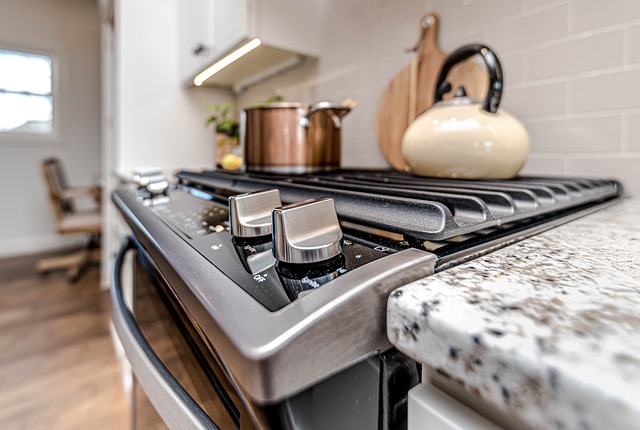Home appliances are essential to modern living, providing convenience and efficiency in managing everyday tasks. From refrigerators to washing machines, dishwashers to ovens, these appliances make our lives easier. However, like all machines, they wear out over time, and the question arises: should you repair or replace them?
Deciding whether to repair or replace an appliance can be challenging. Factors like the appliance’s age, repair costs, energy efficiency, and environmental impact come into play. This comprehensive guide will help you navigate these decisions, ensuring you make the best choice for your household and budget.

Understanding Appliance Lifespans
Before making a repair or replace decision, it’s important to understand the average lifespan of common household appliances. Here’s a breakdown:
- Refrigerators: 10-20 years
- Dishwashers: 7-12 years
- Ovens/Stoves: 10-15 years
- Microwaves: 7-9 years
- Washing Machines: 8-12 years
- Dryers: 10-13 years
- Water Heaters: 8-12 years
- Air Conditioners: 10-15 years
These lifespans are average estimates, and many factors—such as usage, maintenance, and brand quality—can affect how long your appliances last. If your appliance is nearing or past its expected lifespan, it may be more economical to replace it, especially if the repair costs are significant.
Factors to Consider When Deciding to Repair or Replace
Cost of Repair vs. Replacement
One of the most critical factors is the cost of repair compared to replacement. A good rule of thumb is the “50% rule”: if the repair costs are more than 50% of the price of a new appliance, it’s generally more economical to replace it. However, there are exceptions, especially for high-end appliances or ones with sentimental or aesthetic value.
To help make this decision, get a quote from a certified technician for the repair and compare it to the cost of a new appliance with similar features. Be sure to factor in any warranties you may have, as this could lower repair costs significantly.
Energy Efficiency
Older appliances tend to be less energy-efficient compared to newer models. Over time, improvements in technology have made modern appliances significantly more energy-efficient, helping you save on utility bills and reduce your carbon footprint. If your old appliance consumes a lot of energy, it might be worth replacing it with a newer, more efficient model.
For instance, a refrigerator from the 1990s could use up to twice the electricity of a new Energy Star-rated model. In such cases, upgrading to a more energy-efficient appliance not only reduces your environmental impact but can also save you money in the long run through lower energy bills.
Environmental Impact
The environmental implications of repairing versus replacing are worth considering. While repairing an appliance can extend its life and keep it out of a landfill, replacing it with an energy-efficient model could have long-term environmental benefits.
Additionally, many new appliances are made with recyclable materials and designed with sustainability in mind. If you choose to replace an appliance, consider donating or recycling it responsibly to minimize its environmental impact.
The Age of the Appliance
As appliances age, they may become more prone to breakdowns. While a repair might fix the immediate issue, other problems could arise soon after, especially if the appliance is nearing the end of its expected lifespan. If your appliance is older and you’re facing frequent repairs, it might be time to consider a replacement.
Newer appliances are also likely to have more modern features, better performance, and enhanced safety standards. Upgrading to a newer model can bring significant convenience and efficiency improvements.
Frequency of Repairs
If you find yourself constantly calling the repair technician, it’s a sign that your appliance might be on its last legs. Frequent repairs can add up quickly, both in terms of cost and the inconvenience of having an appliance that’s regularly out of commission. If repairs are becoming a regular occurrence, replacing the appliance may be a more cost-effective solution in the long term.
Safety Concerns
Safety should always be a top priority. If your appliance is malfunctioning in a way that could pose a hazard—such as a gas stove with a faulty ignition or an oven with unpredictable heating—it’s essential to weigh the risks. In some cases, repairing these issues might not be enough to guarantee safety. If your appliance has outdated safety features or poses a potential danger, replacement is likely the best option.
Technology and Features
Technology evolves rapidly, and so do appliances. Modern appliances come with a range of smart features that can make your life easier, from energy-monitoring apps to voice-controlled operation. If your older appliance lacks these features and you’re keen to enjoy the benefits of modern technology, upgrading might be a worthwhile investment.
For example, newer refrigerators might come with smart temperature control, energy-saving modes, or even built-in water filters. Upgrading to a new appliance with the latest features can enhance both functionality and convenience in your home.
Appliance-Specific Considerations
Each type of appliance presents unique factors to consider when deciding whether to repair or replace. Here’s a look at specific appliances and their individual repair vs. replacement dynamics.
Refrigerators
Refrigerators are essential, running 24/7 to keep food fresh. Because they’re constantly working, they are more prone to wear and tear over time.
Signs You Should Repair:
- Minor issues, such as a broken door seal or malfunctioning light, are easy and affordable to fix.
- If the refrigerator is under 10 years old and the repair is under 50% of the cost of a new one, repairing is usually worth it.
Signs You Should Replace:
- The refrigerator is over 15 years old and has significant cooling issues.
- The compressor fails or the refrigerator is leaking refrigerant.
- You experience frequent breakdowns or the appliance consumes excessive energy.
Dishwashers
Dishwashers save time and water, but leaks and malfunctions can cause headaches.
Signs You Should Repair:
- The dishwasher is less than 8 years old, and issues like broken latches, clogged drains, or worn-out seals are relatively inexpensive to fix.
- It’s not draining properly, but you suspect a blockage that can be cleared.
Signs You Should Replace:
- The dishwasher is over 10 years old, and the cost of repairs is mounting.
- There’s severe rust on the interior or the motor fails.
- Water efficiency is a concern, and a new model would significantly reduce water usage.
Washing Machines
Washing machines endure frequent use, often leading to parts wearing out over time.
Signs You Should Repair:
- The washer is less than 8 years old, and the issues are minor, such as a broken belt, a small leak, or a defective pump.
- The drum isn’t spinning, but it’s likely due to a fixable issue like a malfunctioning lid switch.
Signs You Should Replace:
- The washer is over 10 years old, or the motor or transmission needs replacement.
- You’re facing repeated breakdowns, or the appliance is no longer cleaning clothes effectively.
- New models offer better water and energy efficiency.
Dryers
Dryers often pair with washing machines in terms of lifespan and wear.
Signs You Should Repair:
- The dryer is less than 10 years old, and the issue is minor, such as a broken heating element or faulty thermostat.
- The drum spins but doesn’t heat, which can often be repaired affordably.
Signs You Should Replace:
- The dryer is over 10 years old, or repairs involve expensive parts like the motor.
- It’s no longer drying clothes efficiently, or you notice a significant spike in energy usage.
- New models have advanced moisture sensors that prevent over-drying and save energy.
Ovens and Stoves
Ovens and stoves are among the most durable appliances but can suffer from electrical or gas-related issues.
Signs You Should Repair:
- The appliance is less than 10 years old, and the problem is with individual components like a broken heating element or malfunctioning control panel.
- Repairs are minor and won’t disrupt the overall performance of the stove or oven.
Signs You Should Replace:
- The oven or stove is over 15 years old, or multiple components (burners, ignition systems) are failing.
- You’re concerned about outdated safety features, especially with gas stoves.
- Newer models offer improved cooking precision, energy efficiency, or smart features.
Warranty Considerations
If your appliance is still under warranty, the decision to repair becomes easier, as the warranty will likely cover the repair cost. Many appliances come with a manufacturer’s warranty that lasts for one to five years. Extended warranties or service contracts may also provide coverage for parts and labor.
Before making a decision, check whether your appliance is still under warranty and what repairs are covered. If the warranty is about to expire and the repair costs are rising, it may be worth considering a replacement to avoid future out-of-pocket expenses.
DIY Repairs: When It’s an Option
If you’re handy and have experience with appliances, some minor repairs can be handled on your own. Replacing a broken door latch, unclogging a dishwasher, or fixing a leaking washing machine hose are relatively simple tasks that can save you money on technician fees.
However, always be cautious with DIY repairs. If you’re not familiar with electrical or gas systems, attempting a repair could be dangerous and may void the appliance’s warranty. When in doubt, it’s best to call a professional.
The Hidden Costs of Replacement
While replacing an appliance might seem like the most straightforward solution, it’s essential to factor in some hidden costs:
- Installation Fees: Many appliances require professional installation, especially for gas appliances or built-in models like dishwashers and wall ovens.
- Haul-Away Costs: Disposing of your old appliance often incurs a haul-away fee. Some retailers include this service for free, but it’s not always the case.
- Upgrading Infrastructure: Replacing an older appliance may require upgrading your home’s electrical or plumbing systems, especially if the new appliance has more advanced features or requires a higher power capacity.
Conclusion
Deciding whether to repair or replace an appliance isn’t always straightforward, but by considering factors like repair costs, energy efficiency, the appliance’s age, and safety concerns, you can make an informed choice.
If the repair is minor and cost-effective, repairing the appliance is often the best option. However, if the appliance is nearing the end of its lifespan, frequently breaks down, or consumes excessive energy, investing in a new, energy-efficient model may save you money in the long run.
Remember, each appliance and situation is unique. Consider your household’s needs, the long-term costs, and environmental impact when making your decision. Whether you choose to repair or replace, keeping your appliances in top working order ensures they continue to make life easier and more efficient.
Zuta Appliance Repair: Expert Home Appliance Repair Services for Your Berkeley Kitchen
In the heart of Berkeley, California, Zuta Appliance Repair is your trusted partner for maintaining the functionality and convenience of your home appliances. When one of your essential appliances, like your refrigerator, oven, or dishwasher, malfunctions, it can significantly disrupt your kitchen’s efficiency. That’s why we are committed to providing top-tier repair services for a wide range of home appliances. Whether it’s a broken icemaker or a faulty stove, our expertise ensures your appliances are back to working efficiently, minimizing inconvenience and keeping your kitchen running smoothly. With Zuta Appliance Repair, you’re not just getting a repair—you’re receiving a promise of quality, integrity, and reliability that enhances your kitchen’s performance and peace of mind.
Experience comprehensive solutions to all your home appliance issues with Zuta Appliance Repair. Our specialized services are designed to extend the life of your appliances and restore your kitchen’s full functionality. Our skilled team, equipped with unmatched expertise and a friendly approach, offers cost-effective solutions that deliver long-lasting results. This is more than just a repair service—it’s about restoring comfort and convenience to your home. Choose Zuta Appliance Repair for an improved lifestyle. Contact us now at (415) 592-4633 and let us get your appliances back to being reliable, efficient parts of your daily life, ensuring peace of mind and uninterrupted kitchen convenience.
Disclaimer
The materials available on this website are for informational and entertainment purposes only and not to provide legal or professional advice. You should contact your attorney or home improvement specialist to obtain advice concerning any particular issue or problem. You should not act or refrain from acting based on any content included in this site without seeking legal or other professional advice. The information presented on this website may not reflect the most current home improvement developments. No action should be taken in reliance on the information on this website. We disclaim all liability concerning actions taken or not taken based on any or all of the contents of this site to the fullest extent permitted by law.







